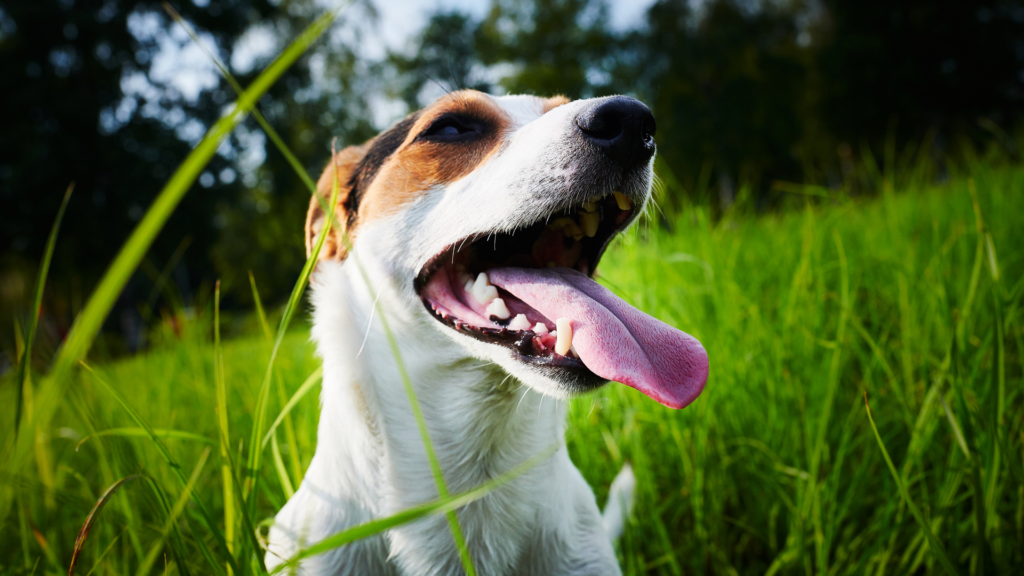Puppy breath can be a term of endearment, but as your dog ages, that cute little smell can quickly turn rancid. And while you love your dog, the smell of their breath as they come in for a kiss on the face can be a turn off.
As a responsible dog owner, you likely already know the key to maintaining good oral hygiene is regular brushing. But if your dog’s breath could still use a little sprucing up, there are some tips and natural remedies you can try to tame it. Read on to better understand what causes your pup’s foul breath, and how you can help fix it.
Contents
What Causes Bad Breath in Dogs?
Good dental health is critical for a dog’s overall well-being. If it’s not properly maintained, halitosis – or chronic bad breath – can occur. This is most often caused by periodontal disease arising from plaque (biofilm) and tartar build-up.
This build up of bad bacteria is most commonly the result of the food your dog eats. Whenever a dog eats, food particles mix with bacteria in the dog’s mouth, and, if your pet’s teeth are not brushed soon after eating, the residue forms a film called plaque. Plaque buildup can harden into tartar if not brushed right away, which leads to decay that creates smelly sulfur compounds. This smell is often a leading indicator of dental or gum disease, which can typically be treated by your vet with a professional cleaning.
Other, more extreme, causes of bad breath in dogs includes kidney disease, which can make a dog’s breath smell like ammonia, diabetes, which can give your dog’s breath a sweet, almost fruity smell, and oral tumors, which lead to dead areas in the mouth that build up with foul-smelling bacteria. If you notice masses in your dog’s mouth, be sure to contact your vet to see if they need to be surgically removed.
Bad Breath Preventions
Along with regular brushing and vet checkups, your dog’s breath can be managed with a few at-home remedies to maintain your pup’s oral hygiene, and offer some relief for your nose!
Brief Brushing
Just like you brush your teeth daily, your dog’s teeth could use a daily brushing – about 30 seconds or so – to help remove built up plaque and bacteria. Set a time aside each day to brush your dog’s teeth with a dog-specific toothbrush and toothpaste, which are designed to be gentle on their gums.
Teeth-Cleaning Chew Toys
Purchase a few chew toys designed to clean your pups teeth to fight odor-causing bacteria and gum disease. These chew toys are made with textures designed to help clean hard-to-reach areas of your dog’s mouth, all the way down to the gumline.
For older dogs and those with softer teeth, you can try chewable treats, like Greenies, which are packed with vitamins and minerals to fight bad breath, and come in a unique texture that gently cleans teeth and gums.
Probiotics for Pups
To counteract bad bacteria, provide your pup with a probiotic packed with beneficial bacteria that can outnumber and fight the harmful, halitosis-causing kind. Probiotics not only help keep bad breath at bay, but also supercharge your dog’s overall well-being.
Natural Remedies
There are a few natural remedies you can try with ingredients found in your kitchen and garden! Parsley, for example, is perfectly safe for dogs, and eating a handful or two of this herb each day can do wonders in freshening up their breath. Additionally, adding a teaspoon or two of coconut oil to your dog’s food every day can provide a variety of health benefits, including a fresher mouth.
Remember, annual dental check-ups, daily teeth brushing, and chew toys designed for dental hygiene can help keep your dog’s breath in check. But if you’ve tried these tips and your dog’s breath is still terrible, it could be time for a vet visit to assess an underlying health issue.


